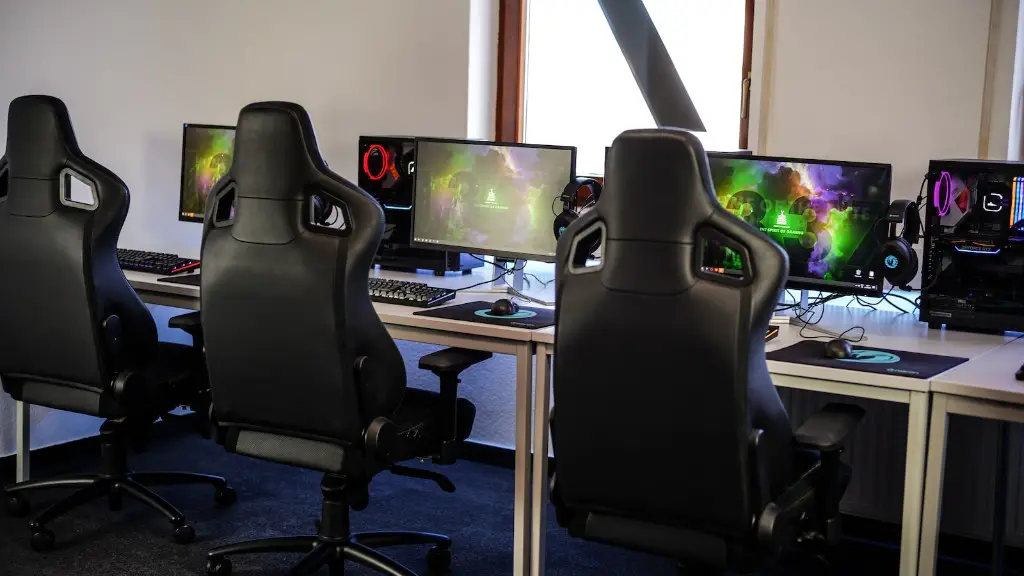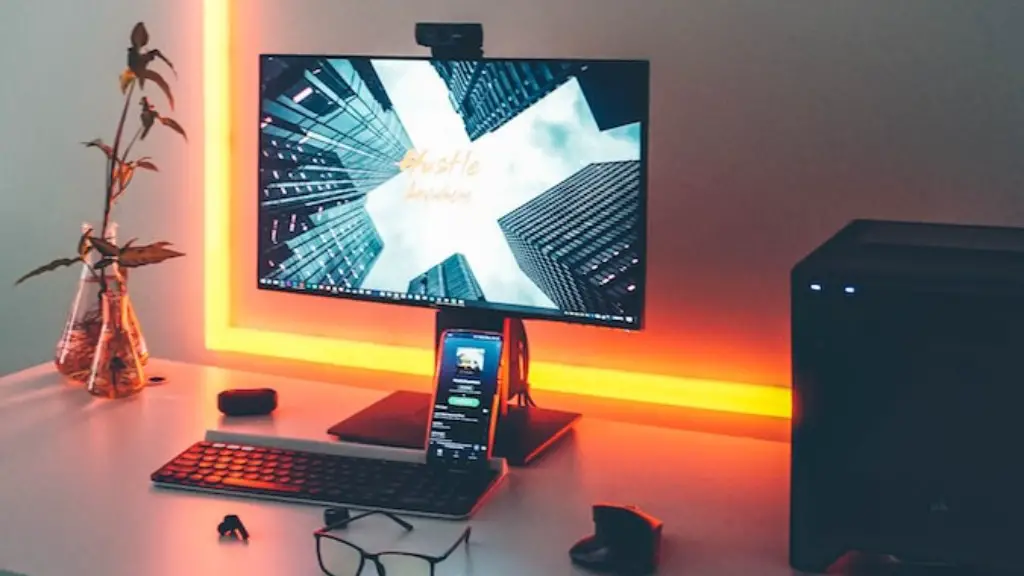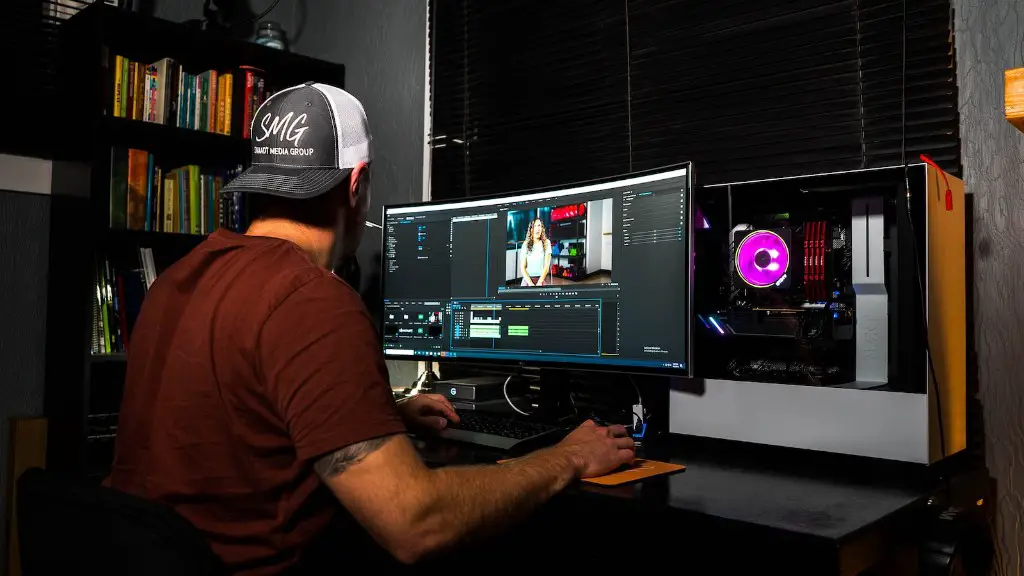The size of the power supply unit (PSU) is important for a gaming PC build as it powers all the components of the PC and can also affect the lifespan of each component. Choosing the right size power supply is essential to ensure that you don’t run into any problems and your machine runs efficiently. It can be tricky to get the right PSU size since you should factor in things like the components of the PC, how much power they consume and how heavily the PC will be used.
Generally speaking, it is recommended to get a PSU with a Wattage rating at least 20-30% higher than what your total required power draw is. To calculate the approximate wattage, you need to look up the maximum wattage of your components, such as your CPU, GPU, hard drives, and motherboard and add them all together. A good rule of thumb is to add an additional 20% headroom for potential upgrades or extra components.
The next step is to measure available space inside the case for the PSU. If you’re using a mid or full tower case, you’ll have more flexibility here. Most mid or full tower cases support ATX form factor PSUs which come in various different sizes, from small form factor to full size. Additionally, you should also differentiate between ATX and SFX form factors. ATX is the biggest form factor and comes in several sizes including ATX12V, PicoPSU, EPS, etc.
Of course, if you’re on a budget, it’s only natural to look for the most affordable PSU and it is easy to get sucked into buying a cheaper unit. However, when it comes to PSU, you get what you pay for. Cheaper units tend to lack essential design elements such as better voltage regulation and adequate cooling, which can negatively affect your gaming PC’s performance and also hit its component lifespans.
It is important to remember that the wattage rating on the box of the PSU is actually a maximum wattage, not the actual power output. Hence, it is always preferable to get a PSU from a reliable manufacturer and with a certification from an industry-leading body such as 80 Plus Bronze, Silver or Gold.
When purchasing a PSU for your gaming PC, it is very important to do some research and find out which type and size is best for your needs. It is often advised to buy a PSU with higher wattage than what you actually need since it can offer more power when needed in future. At the same time, it is also important to ensure that the PSU you pick has the required protective features and is from a reliable manufacturer.
Power Supply Types and Features
The PSU comes in a variety of hardware-specific form factors and power ratings. Popular types include ATX12V, EPS and PicoPSU. Features such as remote on/off and voltage sensing are important for certain types of hardware. In addition to size and wattage, other factors such as noise output and cooling performance should also be considered when choosing the right PSU for your gaming PC.
The ATX12V is the most common PSU form factor and meets the latest standards for power supply design. ATX12V power supplies are usually more powerful, provide more connectors and feature more advanced cooling. Aside from ATX12V, some motherboards also require an EPS connector, which is usually used for server-class, high-end and industrial grade systems.
The PicoPSU is a low-power, fan-less power supply which allows the processor to be undervolted. This reduces power consumption, heat output and noise levels for a cool and quiet operation. This makes the PicoPSU ideal for small form factor systems and builds which require a small PSU.
For Gamers and enthusiasts, look for features such as SLI and Crossfire support, continuous power output, voltage stabilization and stability, power factor correction (PFC) and multi-12V rail. PFC will help keep the power supply from drawing too much current from the electric grid. Multi-rail technology will help maximize power efficiency, while active voltage fluctuations will ensure that the power supply will remain stable to meet the power requirements of the system.
Modular cabling can come with the PSU, allowing you to customize and remove the amount of cables you need, which helps with airflow and space inside the case. Modular PSUs are usually more expensive but can make your life easier if you have many cables running to your components.
Power supply Brands
Choosing an appropriate brand of power supply can also be difficult. There are many brand names out there, however, it is important to choose one that promises good quality and performance. Reliable and well-known brands such as Corsair, EVGA, Cooler Master, Seasonic, and Silverstone offer a wide selection of high-quality PSUs that are well-suited for gaming applications.
A good PSU can be one of the most important components in a gaming PC. Not only does a good power supply unit provide the power necessary for components to operate effectively, but it can also influence the lifespan of the components in the PC.
Moreover, buying a power supply with the right wattage rating, form factor and features can save you a lot of money in the long run due to lower operational costs and reduced maintenance costs. It is essential to research the specifications of all components that the PC will have and choose the appropriate PSU accordingly.
Different Operating Programming
The operating programming of the power supply used in a PC gaming system depends on the brand and quality. If a build will include high-end components and overclocking, then a reliable power supply that operates up to at least 80 Plus Gold or Platinum level is necessary. When overclocking and high-end components are not used, then a power supply with good operating programming but lower wattage should be adequate.
Operating programming is generally used to determine a power supply’s efficiency and noise. Power supply efficiency is measured in terms of the amount of electricity lost as heat given off by the power supply. Power supply noise is also affected by the cooling fan and is often expressed as a number from zero to ten decibels and is a measure of the sound being created by the fan when it runs at full speed.
Many gaming PC builds today use 80 PLUS Bronze efficiencies or higher, since these forms of power supplies generate less heat, leading to better performance and power storage. 80 Plus Bronze is generally more popular and cost-efficient, while 80 Plus Gold and Platinum are often seen in higher-end models and require more money.
For more reliable gaming PC builds, it is recommended to get a 100% modular power supply, because this will make swapping out components and troubleshooting issues much easier. A 100% modular power supply is one that is completely detachable and removable, making it easier to adjust and change the cables you need for different components. This is especially useful for gamers who continuously switch out components or upgrade specific parts.
Power Supply Ratings
The power rating of the power supply is one of the most important aspects of a power supply unit when it comes to gaming PCs. Power rating usually indicates how much energy a power supply can output at full rated capacity. Most parts require VCC (3.3V, 5V and 12V) plus plus additional power for the processor, RAM and additional controllers. A power rating of at least 500W is recommended for most gaming PCs.
Finally, the wattage rating of the power supply should be closely looked at to make sure that it is suitable for the components that are being used. Most components will have their own power requirements and when combined all the components power needs should not exceed the wattage rating of the power supply.
Another point to consider is the output voltage. Many components require a steady voltage to operate, and if this voltage isn’t within the power supply’s specifications, you should look for a power supply with a higher rating. Additionally, strive to get a power supply with voltage stability that has a continuous output wattage of at least 10-15% higher than what the PC components in your system require.
The best way to ensure that you’re getting the right power supply is to do your research before you make a purchase. Check the specifications of all the components that you are using and make sure that the power supply meets their power requirements. Consider factors such as size, form factor, wattage, voltage stability and continuous power output when choosing a PSU. Also, make sure that you pick a PSU from a well-known and reliable manufacturer.




